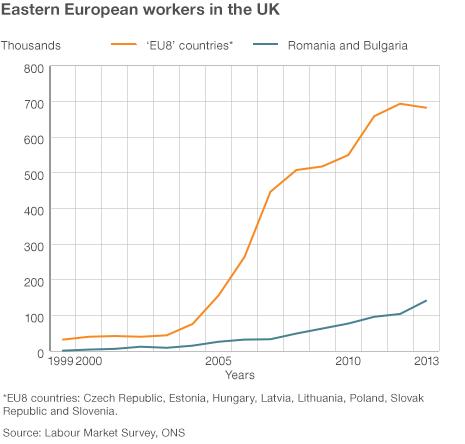Is there benefit tourism in the UK?
- Published
- comments

All EU citizens have the right to work in other member states
The government has promised to push ahead with plans to restrict access to benefits for EU immigrants, despite a European commissioner warning the UK risked being seen as a "nasty country".
Downing Street says it will introduce powers to deport homeless migrants and cut rights to unemployment and housing benefits "as quickly as possible". The EU’s Employment Commissioner, Laszlo Andor, has warned against "hysteria".
But what’s the evidence for benefit tourism? The answer is that there is very little - and it is an extremely complex picture.
That does not mean that benefit tourism doesn’t exist - but what’s clear is that the evidence points strongly in the direction that people migrate to find work or for family reasons. They are less likely to up sticks to cross borders - or even continents - just for a weekly giro.
Back in October, the European Commission published an enormous report on the effects of mobile European citizens on each member state’s welfare and social security systems.
Laszlo Andor: There are "existing EU safeguards" against benefit tourism
Everyone inside the EU - including the British - has the right to seek work in another member state. But that right to move and take work elsewhere does not include an automatic right to benefits - because each nation has a different system and different benefits criteria.
So the people who tend to emigrate within the EU are people of working age - and they tend to move from countries with lower wages to those with higher.
Smaller numbers move for family reasons or to retire abroad, such as the large number of Brits who go to enjoy the Spanish sunshine.
'Magnet effect'
“On average EU migrants are more likely to be in employment than nationals living in the same country,” said the report.
“This study found little evidence... to suggest that the main motivation of EU citizens to migrate and reside in a different member state is benefit-related, as opposed to work or family-related.
“This is underpinned by data which show that, in most countries, immigrants are not more intensive users of welfare than nationals.
“Where they are more intensive users, they tend to use intensely only specific types of benefits linked to their socio-economic circumstances as migrants.
“Where some studies found evidence supporting the "welfare magnet effect" hypothesis, the overall estimated effects are typically small or not statistically significant.”

The report went on to look at the UK - although it said that part of the problem was a lack of reliable data on how and why EU migrants were claiming benefits in the country. Crucially, it said that there was no record on the working record of EU citizens before they made any benefit claim in the UK.
But taking the available data, the report’s authors concluded that “considering all unemployment benefits... the UK is the only EU member state where there were less beneficiaries among EU migrants (1%) than among nationals (4%).”
Standard of living
The report said EU migrant workers in the UK had to meet a residency test before they could claim some benefits - and that restricted their access to payments.
Now, the data on how that policy operates appears to be patchy, but one study by the Department of Work and Pensions says that fewer than one in 10 applications from EU nationals from Eastern and Central Europe (the so-called A8 nationals) was successful.
University College London’s Centre for Research and Migration has also looked at this issue and it found that A8 nationals were about 60% less likely than British citizens to get benefits or social housing.
Campaign group Migrationwatch UK has published its own study, external of benefits across the Union and it says the British system is far more generous - and far easier to access.
It argues that this, in turn, makes the UK ultimately more attractive to migrants from poorer parts of the continent because they are ultimately seeking a better standard of living.
The EU report doesn’t dispute that finding. In fact, it includes lots of data showing how workers move from the poorer south and east of Europe to the richer north and west.
But on the specific point of benefit tourism, it concludes: “No evidence shows that access to the specific special non-contributory benefit income-based Jobseekers Allowance could be considered a significant driver for EU migrants in the UK.”
- Published14 October 2013

- Published14 October 2013
